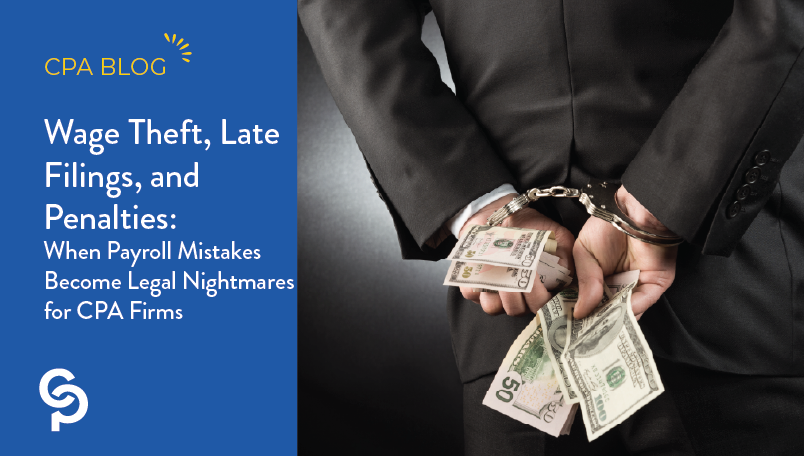Wage Theft, Late Filings, and Penalties: When Payroll Mistakes Become Legal Nightmares for CPA Firms

Payroll is often seen as a routine administrative function, but for CPA firms providing payroll services for clients, mistakes in this area can escalate into full-blown legal and financial nightmares. Here’s how payroll problems unfold, why they matter, and how CPA firms can protect themselves.
Wage Theft Carries Consequences, Unintentional or Not
Back pay refers to the denial of wages or employee benefits rightfully owed. This includes unpaid overtime, illegal deductions, late payments, or failing to pay minimum wage. CPA firms, especially those providing payroll services to businesses, can find themselves implicated if errors they make result in back pay or wage theft claims.
Even when unintentional, these errors can be seen as negligence, especially if there’s a pattern. Consequences can include back pay as ordered by courts of the Department of Labor, liquidated damages, and legal fees incurred by the affected employee(s) that the employer, and possibly the CPA firm, may be ordered to pay.
Clients may also sue CPA firms for professional negligence or breach of fiduciary duty if errors result in wage theft or related claims. Even worse, in jurisdictions with aggressive labor enforcement, firms might be named directly in lawsuits.
Late Filings: The Clock is Ticking
For CPA firms, especially those using bulk filing systems or other software integrations, a minor glitch or miscommunication can cause significant delays with payroll tax filings. If multiple clients are affected, the fallout can be significant. Clients may not only face penalties, but also demand compensation from their CPA firms.
Compounding Penalties: When Mistakes Snowball
When wage theft and late filings converge, the consequences have the potential to snowball out of control. For example, if a CPA firm misclassifies an employee and underpays overtime, and also fails to pay the associated payroll taxes on time, multiple government agencies, including the IRS, state revenue department, and the DOL, could become involved.
In addition, lawsuits by employees can quickly become class actions, especially if the affected group is large. The overall financial exposure can run into 6 and 7 figures depending on the size of the employer and the extent of the error.
The Path to Prevention: Best Practices for CPA Firms
To avoid these costly pitfalls, CPA firms should consider the following risk management strategies:
- Automate with accountability. Use reliable payroll software with built-in compliance checks, but don’t rely solely on automation. Schedule human audits to catch anomalies.
- Regular training. Ensure all staff involved in payroll understand current labor laws, IRS rules, and filing deadlines. Laws change frequently, especially at the state level.
- Organize and archive all workpapers. Maintain detailed records of payroll calculations, tax filings, client approvals, and correspondence. These documents serve as crucial evidence if a dispute arises.
- Client education. Clients must understand their role in providing timely and accurate payroll data. Establish clear engagement letters that outline responsibilities, including penalties for late submissions.
- Professional liability insurance. A high-quality errors and omissions policy can help mitigate financial damage in the event of a lawsuit.
- Third-party reviews. Occasionally engage an external auditor to review your payroll processes to ensure best practices are followed.
In the world of payroll processing, the margin for error is razor-thin. What begins as a simple oversight can spiral into a legal and financial ordeal. CPA firms must treat payroll services as a high-risk, high-responsibility service line.
By investing in systems, training, and proactive communication, CPA firms can protect themselves and their clients from the consequences of payroll miscues.






